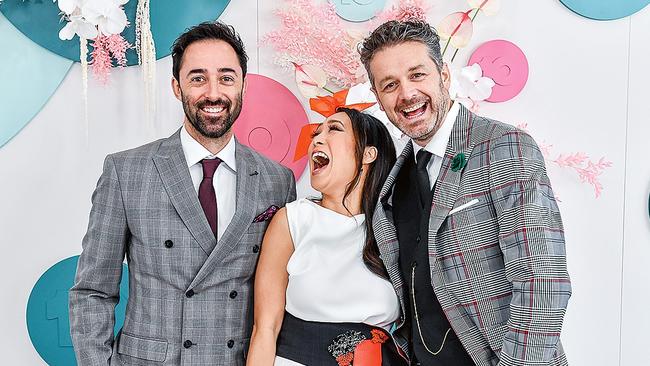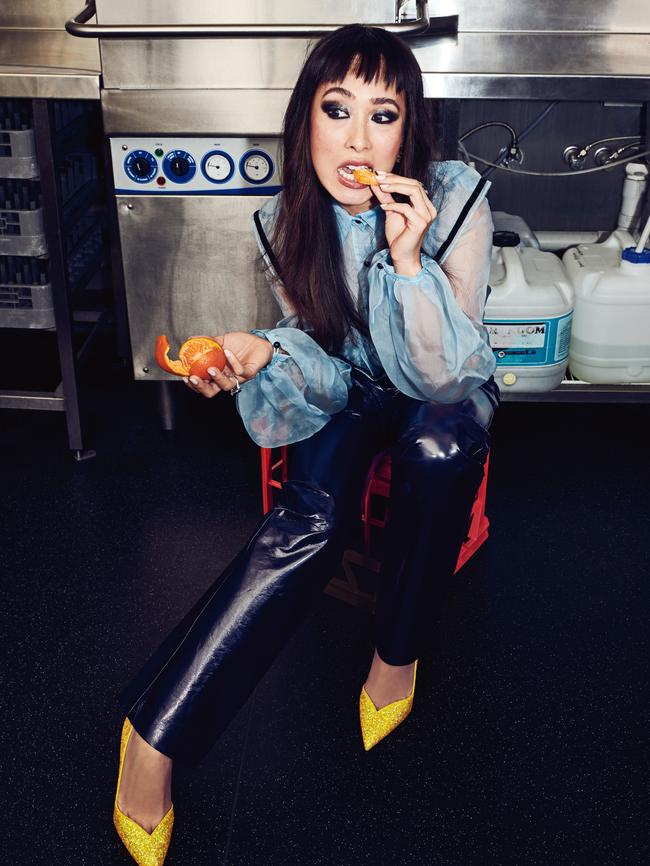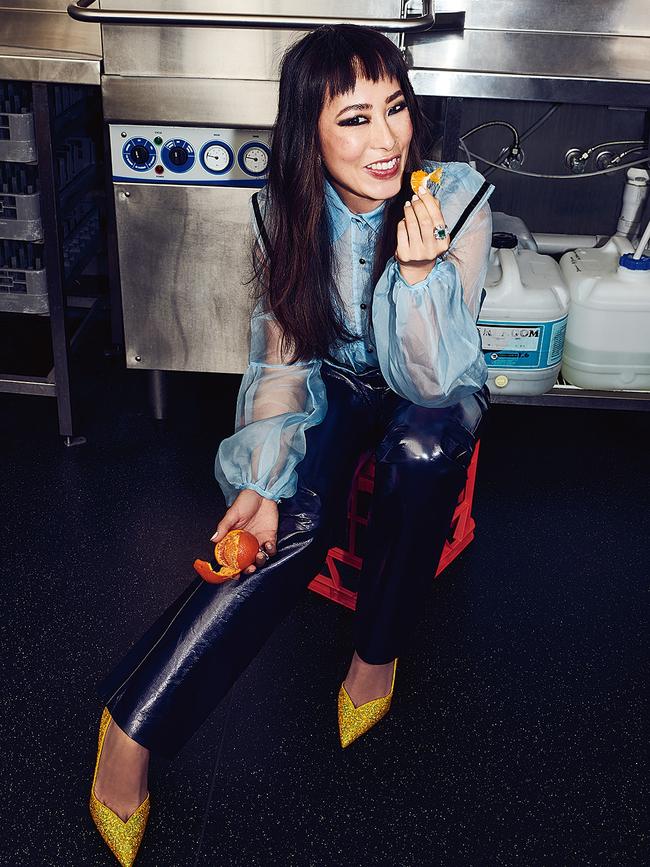What you should know about MasterChef’s new judge
Next year, Melissa Leong will become MasterChef Australia’s first female and first Asian judge. In an exclusive interview, she reveals how she got the job, why diversity matters – and what she really thinks about the former judges.
Just before quarter past nine one morning last month, Melissa Leong stood side of stage feeling incredibly excited, but equally as nervous.
After several weeks of rumours, denials and secrecy, the moment had finally come – Leong and chefs Jock Zonfrillo and Andy Allen were minutes away from being announced as the new judges of Network 10’s mega-hit cooking program MasterChef Australia.
As the three stood waiting for the stage manager to give them the go ahead to walk out into the spotlight at the premier media event – where an impatient audience of hundreds awaited their reveal – they took each other’s hands.
“It was a real moment,” Leong tells Stellar. “I said, ‘Before it all starts, we’re in this together, we’re doing this as a team. And never let us forget this moment, right now.’ It was a bit emotional. And then we stepped out onto the stage and into the next chapter of our lives.”

If that sounds like a bold statement, consider this: MasterChef Australia has aired for 11 consecutive seasons to steady ratings, and produced winners and contestants who have gone on to not only create successful businesses but become household names: think the likes of Julie Goodwin, Poh Ling Yeow, Adam Liaw, Marion Grasby and Justine Schofield.
Brand-name chefs Jamie Oliver, Marco Pierre White, Maggie Beer, Heston Blumenthal and Gordon Ramsay have made consistent guest appearances.
There have been four spin-offs, and the success of the MasterChef franchise has prompted other networks to create cooking shows of their own.
The program airs in more than 40 countries globally, bringing the total audience pool to millions and providing a huge level of star power for the judges.
So when contract negotiations broke down in July this year between Network 10 and the original judges – Matt Preston, Gary Mehigan and George Calombaris – the big question on everyone’s lips was, “Who will replace them?”

When the answer came, the response was somewhat muted.
Leong is a highly regarded food and travel writer who co-hosted SBS’s The Chefs’ Line. Both Zonfrillo, who hosted Seven Network’s Restaurant Revolution in 2015 and Allen, who won MasterChef Australia in 2012, own their own restaurants.
But outside of foodie circles, the judges remain virtually unknown to the general public, and the headlines and social media chatter that followed the big reveal were telling.
“We expected [the reaction], but we were not at all put off by it,” says Leong, 37, with a laugh. “We’ve worked hard in our industry to be where we are, and we stepped into this role with a huge amount of confidence, armed with everything we’ve learnt.
“And remember that Gary, Matt and George were respected in our industry, but also were not very well-known when they stepped into this MasterChef role.”
Leong knows there are many eyes on her and her fellow judges right now and that, ironically, they are the ones who are being judged.
Comments the food writer made seven years ago on Twitter about MasterChef Australia’s credibility as a training ground for aspiring chefs have recently resurfaced, with some questioning the apparent negativity of the tweets.
While she has admitted that perspectives change over time, Leong also notes that “the tweet had nothing to do with MasterChef at all. The comment was actually about entitlement. In hospitality, we pride ourselves on doing work. And the comment was, ‘If you want to be a chef, by all means, go on a show like MasterChef, and those doors will open for you. But take that opportunity and use it to go out there and do that hard work.’”


There are also inevitable comparisons, especially between her and fellow food critic and writer Matt Preston. “I am inspired by Matt and everything he’s done in his career. He’s an incredible human being, very intelligent, very articulate, very stylish,” she says.
“But at the same time, I’ve worked really hard to love the skin that I’m in. Why would I want to be anybody else other than me?”
And in case you were wondering whether there was any bad blood between judges past and future, the reply is a very firm no. In fact, Leong messaged the former judges immediately after the announcement was made.
“I just wanted to express my gratitude for everything that they’ve set up. And they’ve been nothing but wonderful and supportive. It feels really good that we’re going into this with their blessing.”
Yet even now, Leong is still processing her new role. “It all happened so fast. I never in a million years thought I would be considered for the job. I didn’t put my hand up... It went from X amount of names to a smaller group of names to ‘you’re at the top of the group of names’ and after a few short meetings it was all really done,” she says.
It wasn’t a decision Leong took lightly, either – she thought long and hard about accepting the position, given the scrutiny it would invite into her life and of those she loves.
There was also the added gravitas of Leong being not only the first female judge, but the first Asian judge on the show.
“The discussion of representation is more and more prevalent right now,” says Leong, who admits she “openly cried” upon seeing Crazy Rich Asians star Constance Wu on the cover of Time magazine last year, and was overjoyed by the global success of the 2018 romantic comedy that grossed more than $300 million worldwide at the box office.

“I think Sandra Oh put it best when she spoke about not being seen, and then seeing yourself represented. For me, watching Sandra, and Constance and Lee Lin Chin – we only had a handful of people here in Australia, growing up, that I could see myself in,” says Leong.
“Diversity is a word that we hear a lot at the moment, and I think it can be dangerous that some people think diversity is a way of excluding others. Diversity is about inclusivity for all. It’s crucial for humans to feel connected. We need to feel seen.”
AS A FIRST GENERATION Asian-Australian, Leong straddles two cultures and thus two schools of thought. One is to work extremely hard, stay humble, and good things will then be bestowed. The other is to hustle, stand up for yourself, and ask for what you think you deserve.
In her lifetime, Leong has utilised both methods. Like many migrant Asian families – her parents moved to Australia from Singapore in the 1970s – there was an expectation she would become a doctor, lawyer or accountant. And while she did study accounting and obtained a degree in economics from the University of Sydney, Leong always knew she would not follow any other path other than her own.
“My parents realised very early on when I was a kid, I was always going to do life my way,” she says. “Which was maybe very challenging for them because they grew up in a very tight-knit community of friends whose parents had moved from other parts of Asia as well,” she says.

“I did the things that were expected of me because I am respectful of my parents and what they want for me. But I, at some point, had to stay true to myself, and say, ‘Well, I don’t want to do those things.’”
Her parents are proud of her, especially now that they “finally know what I do for a living”, she says with a laugh. “They’re like, ‘I sometimes see you on TV, and see you in a magazine.’ So yes, it’s nice for them to see me five nights a week on a popular TV show and see this is what I do now.”
Some of Leong’s earliest memories are of sitting on the floor with her mother counting chillies to make sambal [a chilli paste] and mixing the ingredients for dumpling filling. From a young age, she understood food was part of her DNA and a way to communicate.
“I don’t think there is a Singaporean that isn’t obsessed with food on some level. I was the weird kid that brought weird lunches to school, guilty as charged. I loved introducing my friends to those foods.
“Food is often the way you can first dip your toe into the waters of another culture, and start to understand that culture because we all have to sit down and eat.”
Yet her career didn’t start in food – after graduating from university, Leong worked in digital advertising as a producer. As part of her job, she started a blog on food and through that gained the attention of an editor who thought she would be a good food critic.
Soon she was constantly writing about the topic, and found herself working in food PR. Leong admits it was fun, but she missed writing. She took a 12-week break to re-energise, which somehow became a two-year sabbatical.

“I flew down to Tasmania, and I stayed with the guy who owns the local abattoir. I spent time on the killing floor, learning how to meat pack, and milk sheep, and make cheese. It sounds like an Eat Pray Love moment because I guess it was,” she says.
“It allowed me to be very hands on with food and was the most generous and powerful education I could’ve ever been given.”
Her time in Tasmania was tough, but cathartic. It allowed her to “tap into a great many things I had been holding inside for a long time, including loss, and consolidating the need to find a sense of belonging”.
MORE STELLAR:
Don Johnson: ‘My daughter is the most gifted actress alive’
Katie Holmes on motherhood, fame – and Dawson’s Creek
Yet Leong suffered another setback once back in Sydney – she was diagnosed with an autoimmune condition that left her bedridden for months. Ultimately, those years broke her down and rebuilt her, and she says she is proud of her scars. Recently, the food writer has moved from Sydney to Melbourne and credits her husband, bar owner and former chef Joe Jones, with being her sounding board.
Leong is still uncomfortable with the term “role model” – despite the fact that for many Asian girls and women, that’s precisely what she is.

“I never thought I’d be having a conversation about it,” she says. “I really struggle with that term being put to me, but I do believe in representing myself in a way that I can live with and I can respect.
“I love that MasterChef gives people a window into other cultures and other culinary backgrounds that they might not be familiar with. I’m proud of who I am, as much as being the right person for the job, technically and in a critical sense. And I’m proud of being the other half of who I am – female with an Asian background.”
So the next big thing after Crazy Rich Asians might be... Crazy Kitchen Asians? “Yes, that’ll be the next one for sure!” she says with a laugh.
“This new role is a huge new chapter and a giant step up from what I’ve done. But everything I’ve done before has prepared me for it so I’m excited to get this show on the road. I’m ready.”
MasterChef Australia is coming to Network 10 in 2020.
